Zepeng Li
ViP$^2$-CLIP: Visual-Perception Prompting with Unified Alignment for Zero-Shot Anomaly Detection
May 23, 2025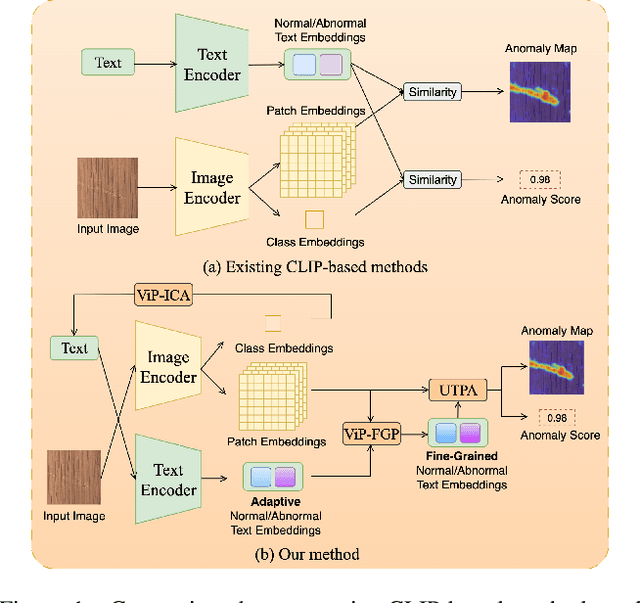

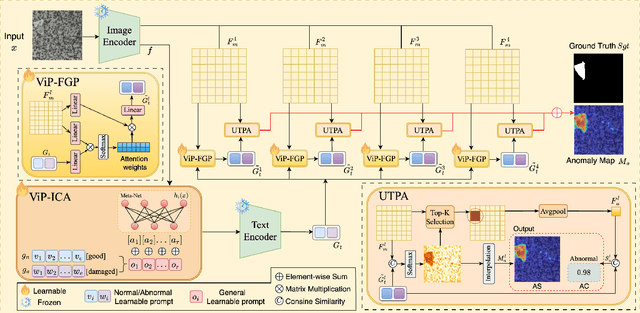

Abstract:Zero-shot anomaly detection (ZSAD) aims to detect anomalies without any target domain training samples, relying solely on external auxiliary data. Existing CLIP-based methods attempt to activate the model's ZSAD potential via handcrafted or static learnable prompts. The former incur high engineering costs and limited semantic coverage, whereas the latter apply identical descriptions across diverse anomaly types, thus fail to adapt to complex variations. Furthermore, since CLIP is originally pretrained on large-scale classification tasks, its anomaly segmentation quality is highly sensitive to the exact wording of class names, severely constraining prompting strategies that depend on class labels. To address these challenges, we introduce ViP$^{2}$-CLIP. The key insight of ViP$^{2}$-CLIP is a Visual-Perception Prompting (ViP-Prompt) mechanism, which fuses global and multi-scale local visual context to adaptively generate fine-grained textual prompts, eliminating manual templates and class-name priors. This design enables our model to focus on precise abnormal regions, making it particularly valuable when category labels are ambiguous or privacy-constrained. Extensive experiments on 15 industrial and medical benchmarks demonstrate that ViP$^{2}$-CLIP achieves state-of-the-art performance and robust cross-domain generalization.
Generation of Drug-Induced Cardiac Reactions towards Virtual Clinical Trials
Feb 11, 2025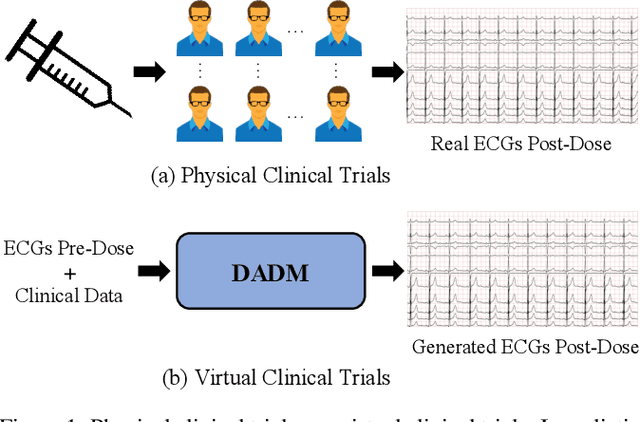
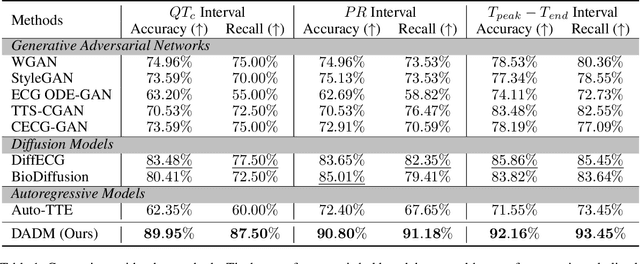
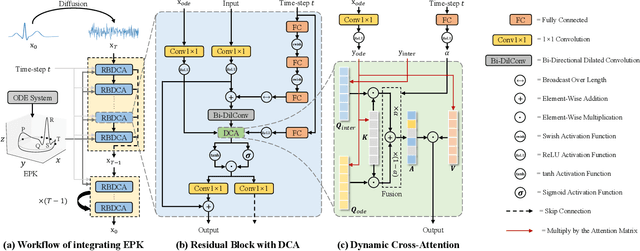
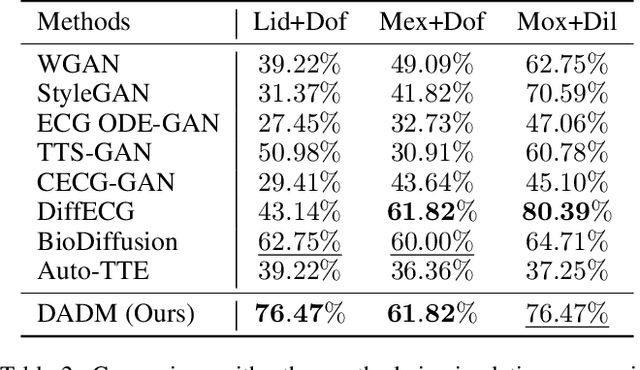
Abstract:Clinical trials are pivotal in cardiac drug development, yet they often fail due to inadequate efficacy and unexpected safety issues, leading to significant financial losses. Using in-silico trials to replace a part of physical clinical trials, e.g., leveraging advanced generative models to generate drug-influenced electrocardiograms (ECGs), seems an effective method to reduce financial risk and potential harm to trial participants. While existing generative models have demonstrated progress in ECG generation, they fall short in modeling drug reactions due to limited fidelity and inability to capture individualized drug response patterns. In this paper, we propose a Drug-Aware Diffusion Model (DADM), which could simulate individualized drug reactions while ensuring fidelity. To ensure fidelity, we construct a set of ordinary differential equations to provide external physical knowledge (EPK) of the realistic ECG morphology. The EPK is used to adaptively constrain the morphology of the generated ECGs through a dynamic cross-attention (DCA) mechanism. Furthermore, we propose an extension of ControlNet to incorporate demographic and drug data, simulating individual drug reactions. We compare DADM with the other eight state-of-the-art ECG generative models on two real-world databases covering 8 types of drug regimens. The results demonstrate that DADM can more accurately simulate drug-induced changes in ECGs, improving the accuracy by at least 5.79% and recall by 8%.
Take Your Steps: Hierarchically Efficient Pulmonary Disease Screening via CT Volume Compression
Dec 03, 2024Abstract:Deep learning models are widely used to process Computed Tomography (CT) data in the automated screening of pulmonary diseases, significantly reducing the workload of physicians. However, the three-dimensional nature of CT volumes involves an excessive number of voxels, which significantly increases the complexity of model processing. Previous screening approaches often overlook this issue, which undoubtedly reduces screening efficiency. Towards efficient and effective screening, we design a hierarchical approach to reduce the computational cost of pulmonary disease screening. The new approach re-organizes the screening workflows into three steps. First, we propose a Computed Tomography Volume Compression (CTVC) method to select a small slice subset that comprehensively represents the whole CT volume. Second, the selected CT slices are used to detect pulmonary diseases coarsely via a lightweight classification model. Third, an uncertainty measurement strategy is applied to identify samples with low diagnostic confidence, which are re-detected by radiologists. Experiments on two public pulmonary disease datasets demonstrate that our approach achieves comparable accuracy and recall while reducing the time by 50%-70% compared with the counterparts using full CT volumes. Besides, we also found that our approach outperforms previous cutting-edge CTVC methods in retaining important indications after compression.
Enhancing Semi-Supervised Learning via Representative and Diverse Sample Selection
Sep 18, 2024Abstract:Semi-Supervised Learning (SSL) has become a preferred paradigm in many deep learning tasks, which reduces the need for human labor. Previous studies primarily focus on effectively utilising the labelled and unlabeled data to improve performance. However, we observe that how to select samples for labelling also significantly impacts performance, particularly under extremely low-budget settings. The sample selection task in SSL has been under-explored for a long time. To fill in this gap, we propose a Representative and Diverse Sample Selection approach (RDSS). By adopting a modified Frank-Wolfe algorithm to minimise a novel criterion $\alpha$-Maximum Mean Discrepancy ($\alpha$-MMD), RDSS samples a representative and diverse subset for annotation from the unlabeled data. We demonstrate that minimizing $\alpha$-MMD enhances the generalization ability of low-budget learning. Experimental results show that RDSS consistently improves the performance of several popular SSL frameworks and outperforms the state-of-the-art sample selection approaches used in Active Learning (AL) and Semi-Supervised Active Learning (SSAL), even with constrained annotation budgets.
CGRA4ML: A Framework to Implement Modern Neural Networks for Scientific Edge Computing
Aug 29, 2024Abstract:Scientific edge computing increasingly relies on hardware-accelerated neural networks to implement complex, near-sensor processing at extremely high throughputs and low latencies. Existing frameworks like HLS4ML are effective for smaller models, but struggle with larger, modern neural networks due to their requirement of spatially implementing the neural network layers and storing all weights in on-chip memory. CGRA4ML is an open-source, modular framework designed to bridge the gap between neural network model complexity and extreme performance requirements. CGRA4ML extends the capabilities of HLS4ML by allowing off-chip data storage and supporting a broader range of neural network architectures, including models like ResNet, PointNet, and transformers. Unlike HLS4ML, CGRA4ML generates SystemVerilog RTL, making it more suitable for targeting ASIC and FPGA design flows. We demonstrate the effectiveness of our framework by implementing and scaling larger models that were previously unattainable with HLS4ML, showcasing its adaptability and efficiency in handling complex computations. CGRA4ML also introduces an extensive verification framework, with a generated runtime firmware that enables its integration into different SoC platforms. CGRA4ML's minimal and modular infrastructure of Python API, SystemVerilog hardware, Tcl toolflows, and C runtime, facilitates easy integration and experimentation, allowing scientists to focus on innovation rather than the intricacies of hardware design and optimization.
 Add to Chrome
Add to Chrome Add to Firefox
Add to Firefox Add to Edge
Add to Edge